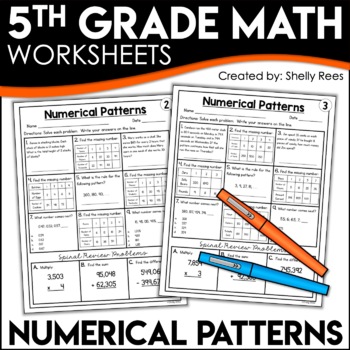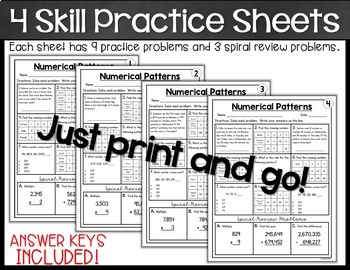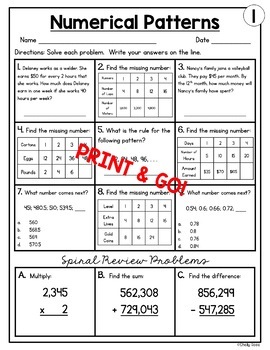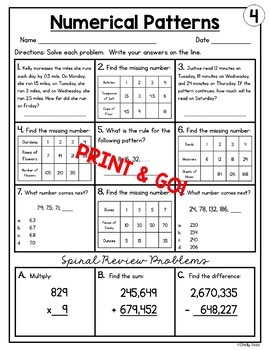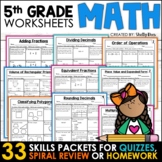Number Patterns Worksheets 5th Grade
- PDF
Also included in
- Looking for easy-to-use math practice for your 5th grade students? This ready-to-go 5th Grade Math Bundle can be used for math homework, spiral review, math quizzes, morning work, test prep review, and so much more! It's so versatile!By purchasing this bundle, you are saving 50% off the price of thePrice $36.00Original Price $72.00Save $36.00
Description
Identifying number patterns is an important skill that 4th and 5th grade students need to master. This no-prep, print and go Numerical Patterns Worksheets Packet is perfect for extra practice of this concept! Practice with whole number patterns and decimal patterns is included on all pages.
Click HERE to SAVE 50% by buying the year-long 5th Grade Math Homework Bundle.
This resource includes 4 practice sheets for the skill of Identifying Number Patterns. Each sheet has 9 practice problems for the skill and 3 spiral review problems at the bottom.
Please see the PREVIEW above for an idea of everything included!
Although the packet is designed to provide math homework, it can be used in other ways (see below). If you choose to use it as math homework, there is one sheet for each night of the week, Monday-Thursday. With 9 problems for each night, it will not be too time-consuming for the student, but will provide enough practice to solidify understanding of the skill.
While this packet was specifically designed to align with 5th grade standards, it is perfect for differentiation in 4th and 6th grades.
There are several other ways you can use this packet:
• Independent practice in class
• Pair and Share activity
• Small group work
• Extra remediation
• Cut apart the squares and use 1 problem as an exit ticket each day
• Test review and practice
• Quick quiz
• Informal assessment
• Guided math work as a whole group
• Early finisher work/bonus problems
Looking for other helpful math resources? Take a look here:
Numerical Patterns Task Card Set
Numerical Patterns Common Core Worksheet Packet
Place Value Patterns Common Core Worksheet Packet
Patterns in Graphing Worksheet Packet
4th Grade Common Core Printable Math Packets
Math Task Card and Poster Sets
Number Patterns 4th Grade Common Core Math Worksheet Packet
Don't forget that leaving feedback earns you points toward FREE TPT purchases. I love that feedback!
Also, follow me and be notified when new products are uploaded. New products are always 50% off for the first 24 hours they are posted. It pays to follow me!
As always, please contact me with any questions!
Thank you so much,
Shelly Rees

